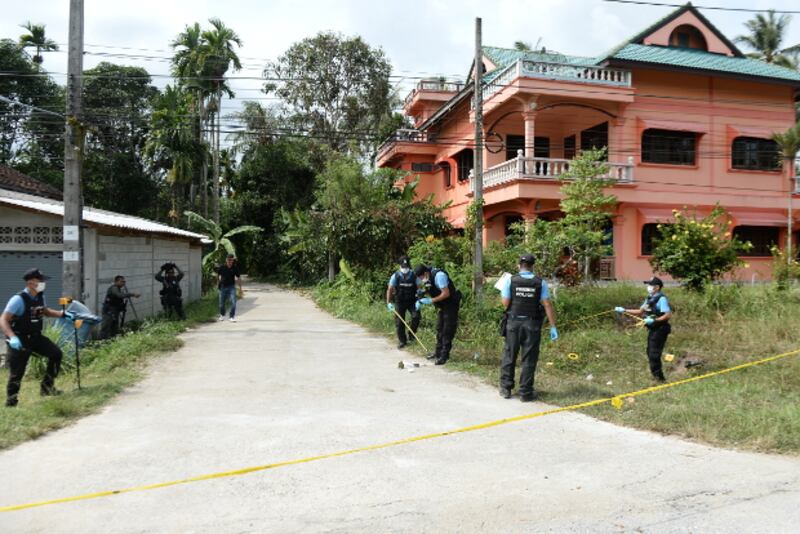Thailand has named a new chief negotiator in stalled talks aimed at resolving a decades-long separatist conflict in its southern border region, while a panel representing insurgent groups has expanded, officials said Tuesday.
Prime Minister Prayuth Chan-o-cha confirmed the change days ahead of the first visit to Bangkok by Malaysian Prime Minister Mahathir Mohamad, who in August had named a new facilitator for the Kuala Lumpur-brokered talks. Mahathir, who began his latest term in office in May, is scheduled to visit Thailand on Oct. 24-25, officials said.
The new Thai negotiator, Udomchai Thammasarorat, is a former commander of an army division that oversees southern Thailand, Prayuth said.
“He will work in line with government policy. We stick to government policy as the principle of the peace talks – as a way to solve violence in the Deep South,” the junta chief told reporters after a cabinet meeting in Bangkok.
Meanwhile, the spokesman for the panel negotiating on behalf of southern rebels, MARA Patani, said it had expanded to include three new groups and planned to present a new proposal after nationwide polls next year.
“We will not forward the demands unless there is a new democratic Thai government being formed after the Thai general election that is expected to be held in February next year,” MARA spokesman Abu Hafez Al-Hakim told BenarNews in Malaysia.
Because of the expansion the umbrella body has rebranded itself as MARA Patani Plus, he added, but declined to identify the three new groups that have come on board.
“More are joining. When we finalize the list, we will announce it,” Abu Hafez said.
He acknowledged there had been tensions within the umbrella body.
“We are from different organizations. Of course, there will problems adjusting to one another,” he said.
When the peace talks between Thailand’s military government and MARA started more than three years ago, five southern rebel groups and factions were originally represented on the panel.
It consisted then of two factions of the Patani United Liberation Organization (PULO); the Patani Islamic Mujahideen Movement (GMIP); the Islamic Liberation Front of Patani (BIPP); and the National Revolutionary Front (BRN), the largest and most powerful of insurgent groups in the Deep South.
Questions persisted, however, about whether MARA truly controlled BRN’s rank-and-file fighters and if BRN’s hardcore leaders were on board with the peace talks. These have been held in various rounds in Kuala Lumpur since August 2015, despite ongoing violence in the predominantly Muslim and Malay-speaking southern border provinces.

Exit Aksara and Zamzamin
Udomchai replaces Gen. Aksara Kerdpol who had led the Thai delegation in the negotiations with MARA since they began.
“The change is because [Aksara] worked so hard for many years, so we changed to a new person,” Prayuth said on Tuesday.
Among the new faces at the table will be Abdul Rahim Noor, a former Malaysian national police chief who replaces Zamzamin Hashim as the facilitator of the peace talks.
“With the appointment of Tan Sri Abdul Rahim Noor as a new facilitator, we expect there will be a slight reshuffle in the composition of the Thai delegation, which has been largely dominated by military representatives,” MARA’s Abu Hafez told Benar last week.
He added then that the talks had been suspended because the Thai side refused to sign a framework deal paving the way for implementing a so-called safety zone, or geographically limited ceasefire in the Deep South that is widely seen as a linchpin for a future peace.
‘Absolutely moribund’
According to Zachary Abuza, a security analyst and expert on the conflict in the Deep South, “the Thai side needed to make some sort of gesture ahead of Mahathir’s upcoming visit.”
“Mahathir just appointed his facilitator, so it made some sense for the Thai side to put in place a new team to revitalize the absolutely moribund peace talks,” Abuza, a BenarNews columnist who teaches at the National War College in Washington, told the news website.
“They have stalled, and whenever that happens you really need some new blood. That said, I do not think that his political overlords are going to give him any latitude.”
Gen. Udomchai, the new head of the Thai negotiating team, “was willing to confront – or at least acknowledge” the problem of impunity among the government security forces in the south, Abuza added.
“It’s not that he fixed it, but he did let several cases move through the courts, unlike other 4th Army commanders. That is something that the Malaysians would acknowledge,” the analyst said.
The separatist insurgency has wracked the Deep South for decades.
Nearly 7,000 people have been killed in violence throughout the region, which borders Malaysia, since the insurgency re-ignited in 2004. The Deep South encompasses Pattani, Yala, and Narathiwat provinces, as well as four districts of Songkhla province.
